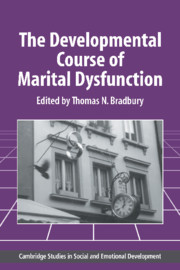Book contents
- Frontmatter
- Contents
- List of Contributors
- Foreword
- Introduction: The Developmental Course of Marital Dysfunction
- Part I Conceptual and Empirical Contributions
- 1 Communication in Early Marriage: Responses to Conflict, Nonverbal Accuracy, and Conversational Patterns
- 2 Marital Aggression, Quality, and Stability in the First Year of Marriage: Findings from the Buffalo Newlywed Study
- 3 Accommodation Processes During the Early Years of Marriage
- 4 The Psychological Infrastructure of Courtship and Marriage: The Role of Personality and Compatibility in Romantic Relationships
- 5 Happiness in Stable Marriages: The Early Years
- 6 Developmental Changes in Marital Satisfaction: A 6-Year Prospective Longitudinal Study of Newlywed Couples
- 7 The Development of Marriage: A 9-Year Perspective
- 8 Premarital Predictors of Relationship Outcomes: A 15-Year Follow-up of the Boston Couples Study
- 9 Optimizing Longitudinal Research for Understanding and Preventing Marital Dysfunction
- 10 Socialization into Marital Roles: Testing a Contextual, Developmental Model of Marital Functioning
- 11 Physical Aggression in Marriage: A Developmental Analysis
- Part II Invited Commentaries
- Author Index
- Subject Index
6 - Developmental Changes in Marital Satisfaction: A 6-Year Prospective Longitudinal Study of Newlywed Couples
Published online by Cambridge University Press: 13 October 2009
- Frontmatter
- Contents
- List of Contributors
- Foreword
- Introduction: The Developmental Course of Marital Dysfunction
- Part I Conceptual and Empirical Contributions
- 1 Communication in Early Marriage: Responses to Conflict, Nonverbal Accuracy, and Conversational Patterns
- 2 Marital Aggression, Quality, and Stability in the First Year of Marriage: Findings from the Buffalo Newlywed Study
- 3 Accommodation Processes During the Early Years of Marriage
- 4 The Psychological Infrastructure of Courtship and Marriage: The Role of Personality and Compatibility in Romantic Relationships
- 5 Happiness in Stable Marriages: The Early Years
- 6 Developmental Changes in Marital Satisfaction: A 6-Year Prospective Longitudinal Study of Newlywed Couples
- 7 The Development of Marriage: A 9-Year Perspective
- 8 Premarital Predictors of Relationship Outcomes: A 15-Year Follow-up of the Boston Couples Study
- 9 Optimizing Longitudinal Research for Understanding and Preventing Marital Dysfunction
- 10 Socialization into Marital Roles: Testing a Contextual, Developmental Model of Marital Functioning
- 11 Physical Aggression in Marriage: A Developmental Analysis
- Part II Invited Commentaries
- Author Index
- Subject Index
Summary
Although the early years of marriage are critical for marital stability (National Center for Health Statistics, 1991), little is known about the processes that maintain marital happiness in stable couples (Dindia & Canary, 1993). The lack of information in this area is unfortunate in light of evidence that even spouses in stable relationships can be dissatisfied with their marriages (Heaton & Albrecht, 1991) and that marital dissatisfaction is linked to physical and psychological problems (Bloom, Asher, & White, 1978).
The relative neglect of what maintains marital happiness may be due to the scarcity of longitudinal studies in the early years of marriage. There are longitudinal data (e.g., Belsky & Rovine, 1990; Cowan et al., 1985; Hackel & Ruble, 1992; MacDermid, Huston, & McHale, 1990; Markman & Hahlweg, 1993) consistent with the view that marital quality declines over the first few years of marriage as spouses negotiate issues regarding conflict, control, and power (Kovacs, 1983). However, most of this information comes from studies of spouses during the transition to first-time parenthood. Without a comparison group of spouses not experiencing this transition, normative changes in marital interactions are confounded with those resulting from parenthood (see Chapter 7 in this volume).
Consequently, longitudinal studies involving newlywed couples who do and do not become parents are needed to chart the developmental course of marital well-being.
- Type
- Chapter
- Information
- The Developmental Course of Marital Dysfunction , pp. 180 - 204Publisher: Cambridge University PressPrint publication year: 1998
- 20
- Cited by



